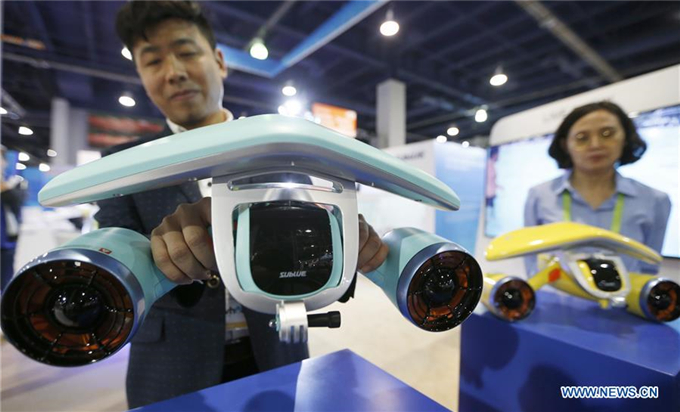On track to a more innovative China

A staff member of Sublue shows WhiteShark Mix, a Chinese innovational underwater scooter, at Consumer Electronics Show (CES) in Las Vegas, the United States, Jan. 10, 2018. (Xinhua/Li Ying)
The start of a new year is the time when individuals and governments commit to make changes that they hope will improve things. This is certainly true in China.
It continues to focus on innovation and entrepreneurship, especially in e-commerce. With a common written language, 21st century telecommunications infrastructure and entrepreneurial spirit among its large and distributed population, China has many natural advantages making it one of the most innovative countries in the world.
A more open China also means that it is embracing modern science and technology and seeking to be a world leader in many of areas apart from e-commerce, such as nanotechnology, artificial intelligence, robotics, renewable energy, Internet of Things, and big data analytics.
This is reflected in the recent announcement by the National Development and Reform Commission concerning the establishment of three science and innovation centers in the Anhui province's Hefei city, Beijing and Shanghai. Such centers are also due to be set up in developing Xiongan New Area and the Guangdong-Hong Kong-Macao Greater Bay Area.
The purpose is to create a cluster bringing together people from multiple disciplines all working together focused on entrepreneurship and innovation.
The country continues to focus on improving infrastructure to promote greater international trade, globalization and internationalization. If the great potential of an Information Economy is to be realized it is important to have in place regulatory, trade and other infrastructure that can facilitate the movement of goods and services both within countries as well as between them.
A recent example of the latest thinking came in an international conference earlier this month in which China hosted key policy people, international organizations, government agencies, and industry players and stakeholders in the e-commerce industry.
The conference theme was: "An innovative, inclusive, strategic and collaborative approach to sustainable cross-border E-commerce." An important outcome of the conference was the passage of the "Beijing Declaration" drafted by China's General Administration of Customs and the World Customs Organization (WCO).
This makes a commitment to improving the WCO Framework of Standards on Cross-Border E-commerce. The declaration recognized the important role of closer cooperation by customs authorities across the world in promoting smooth and efficient international trade in services.
Finally, innovation also needs to occur in government as institutions designed for an industrial age must be re-purposed to meet the needs of a new Information Economy.
To this end, China's National People's Congress will convene in March to review progress against plans in relation to the government's work report and the annual plan on national economic and social development.
This includes a review of budgets and reports on progress. The meeting will also look at how personnel changes, especially those made by the CPC at last year's 19th National Congress, will play out in the alignment of government appointments in key positions.
These and other developments show that 2018 is shaping up to be an innovative year not only for China, but for other countries as well as they seek to advance their economic development in their own way.
Editor: John Li